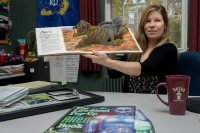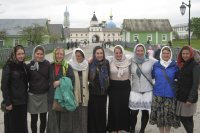
It’s all about the snippets, really: brief snatches of conversation between Bates students and their audiences — professors, staff, friends, parents, relatives and other loved ones — about new ideas and new knowledge created in their academic work at Bates.
Snippets: “We need to tell more people’s stories when we tell history….,” and then “…and I use Ayn Rand as my control video.” A few minutes later, we hear, “…we reject hypothesis No. 1….” followed by “….mentors and role models were a big theme in my findings.”
Words and ideas, conversation and community: Welcome to the annual Mount David Summit, held in person in its traditional venue, Pettengill Hall, for the first time since 2019.
Here’s how it played out, hour by hour:
1:31 p.m. Amore ac Studio
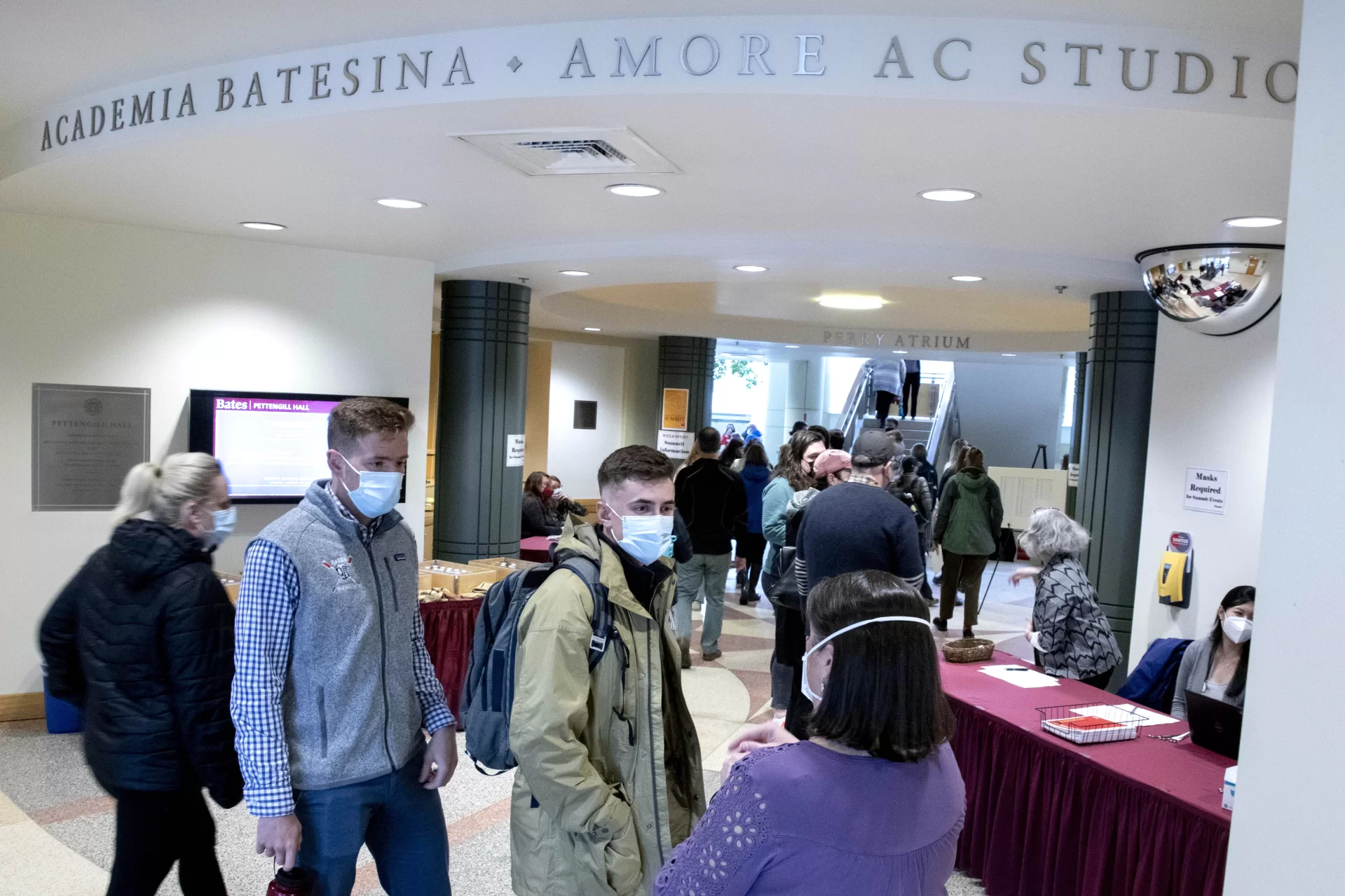
Guests stream into Pettengill Hall beneath the college’s motto, Amore ac Studio, which is invoked in the college’s mission statement: “With ardor and devotion — Amore ac Studio — we engage the transformative power of our differences.”
1:34 p.m. Skin deep
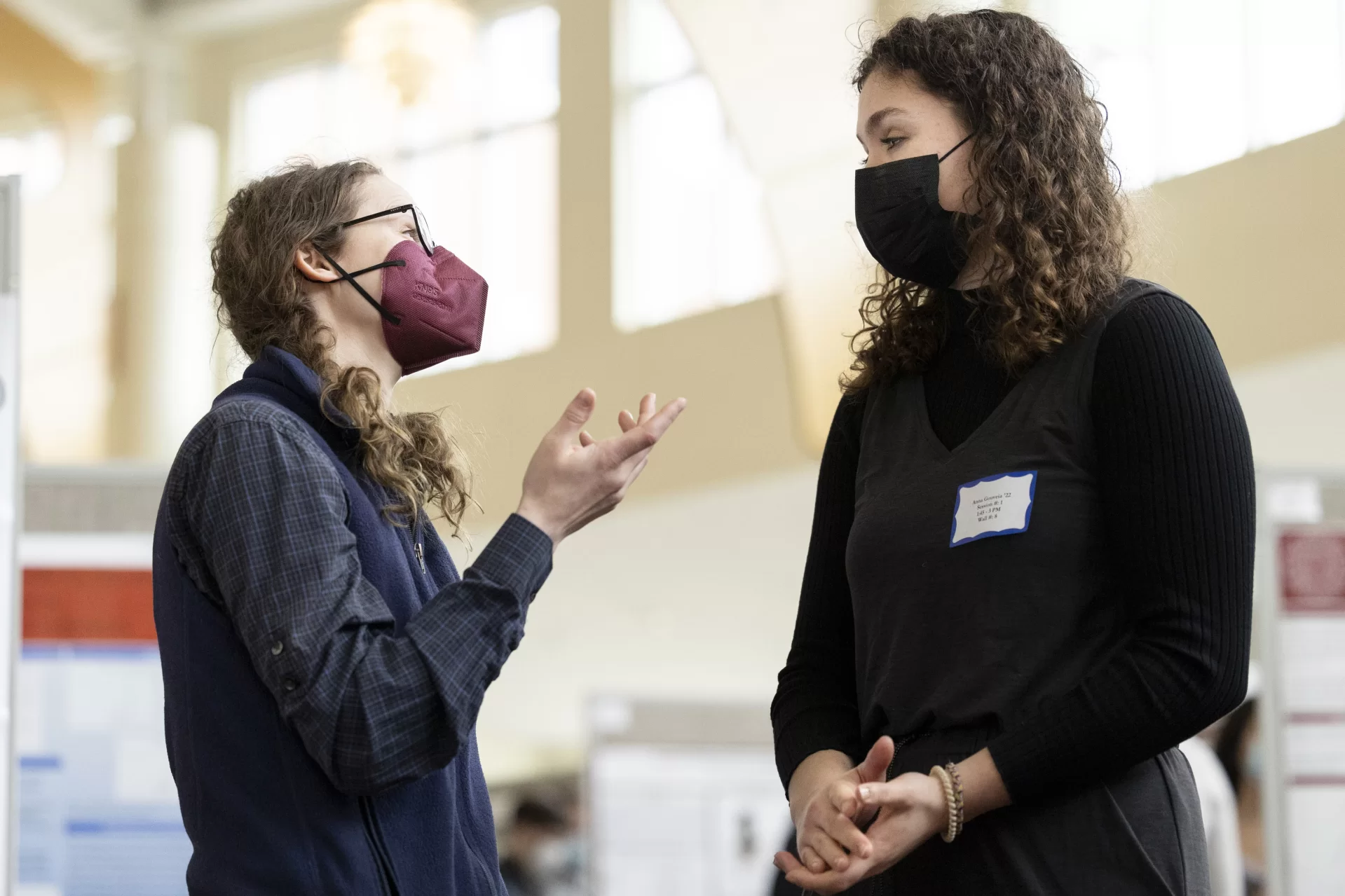
Anna Gouveia ’22 of Jenkintown, Pa., talks with her mentor and senior thesis adviser, Colleen O’Loughlin, assistant professor of chemistry and biochemistry.
Gouveia, who is also a studio art major, looked at the effect of what we do to our skin by applying up to 170 chemicals every days through the use of cosmetics.
This chemical exposure forces the human skin into defensive posture, “to adapt to the stress.” And that affects the ability of Staphylococcus epidermidis, a commensal bacteria important in immune system signaling, to do its job.
1:39 p.m. Hi Mom!
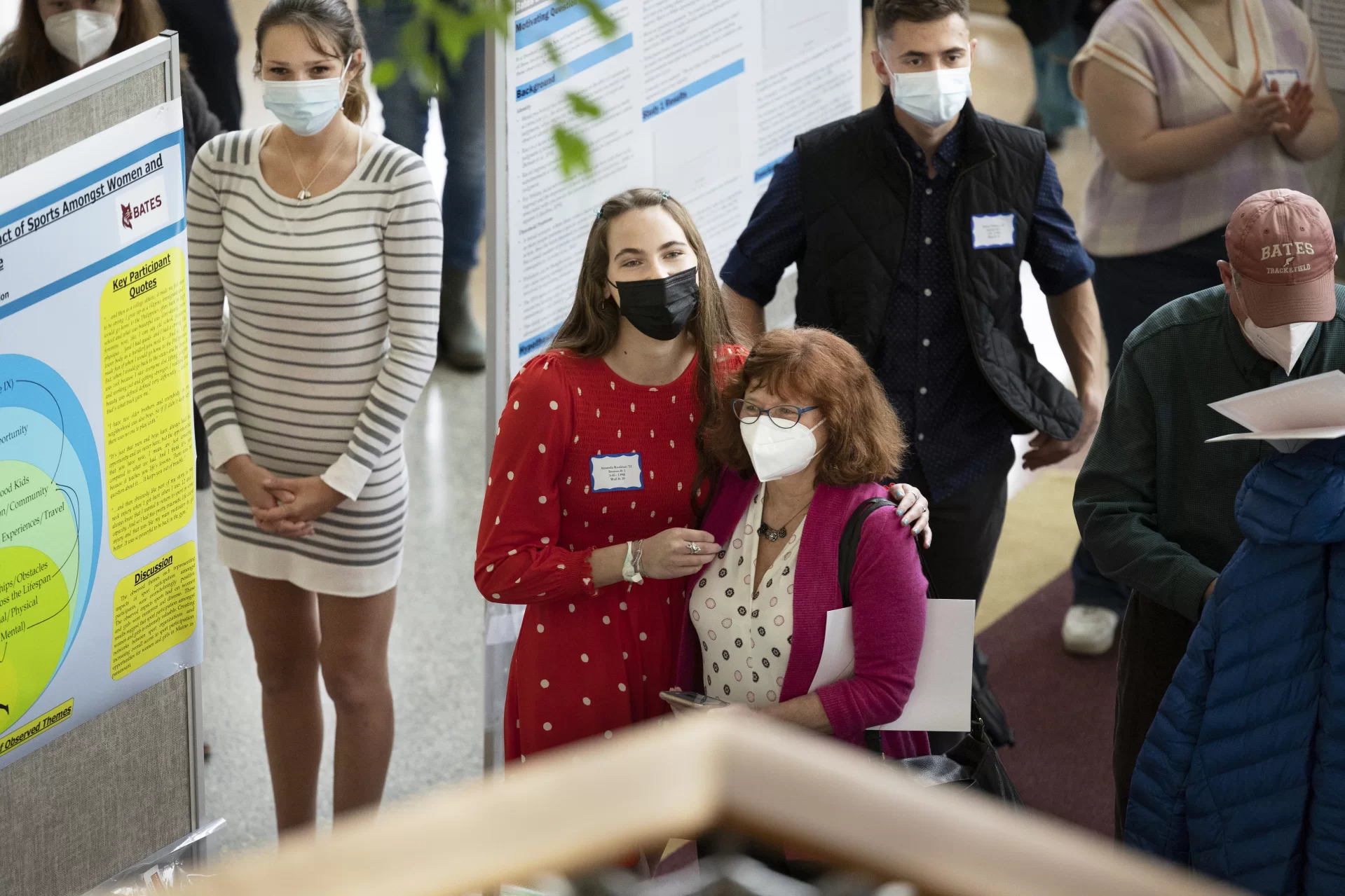
In response to introductory words delivered from a Perry Atrium balcony inviting students to thank those who have supported them, Amanda Kaufman ’22 hugs her mother, Valerie Kaufman.
“My mom actually surprised me by coming to the summit — she thought work would stop her.” But no way. “She brought her work laptop and did work in the car with a hotspot.”
As Kaufman looked at the photograph, she described feeling “just extra thankful that both my parents were there. They’ve always supported me so much and not being able to come to my events (especially track meets) because of COVID was definitely a big bummer.”
1:41 p.m. Welcome!
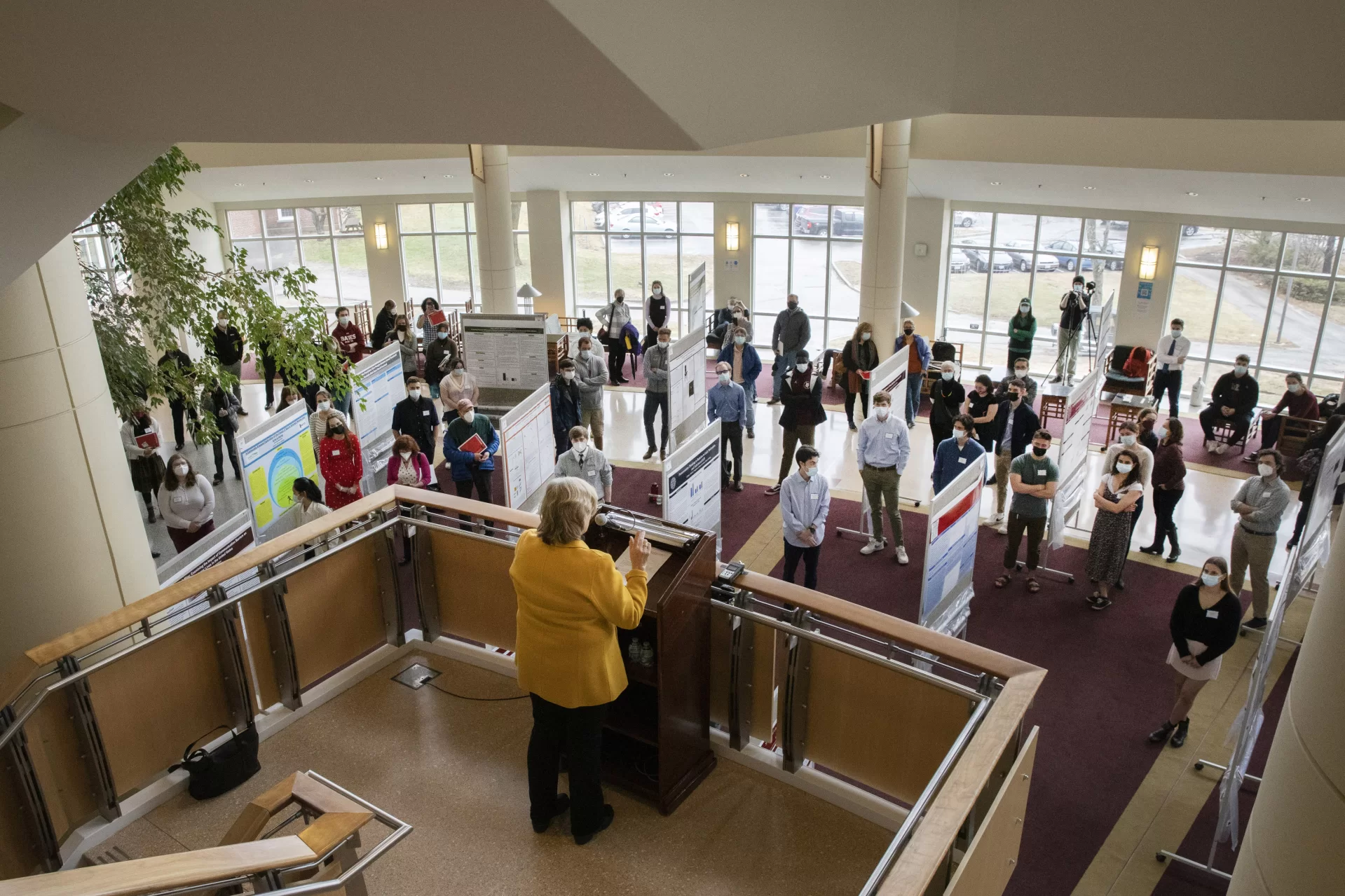
President Clayton Spencer welcomes the Bates community to the Mount David Summit.
1:51 p.m. Positive response
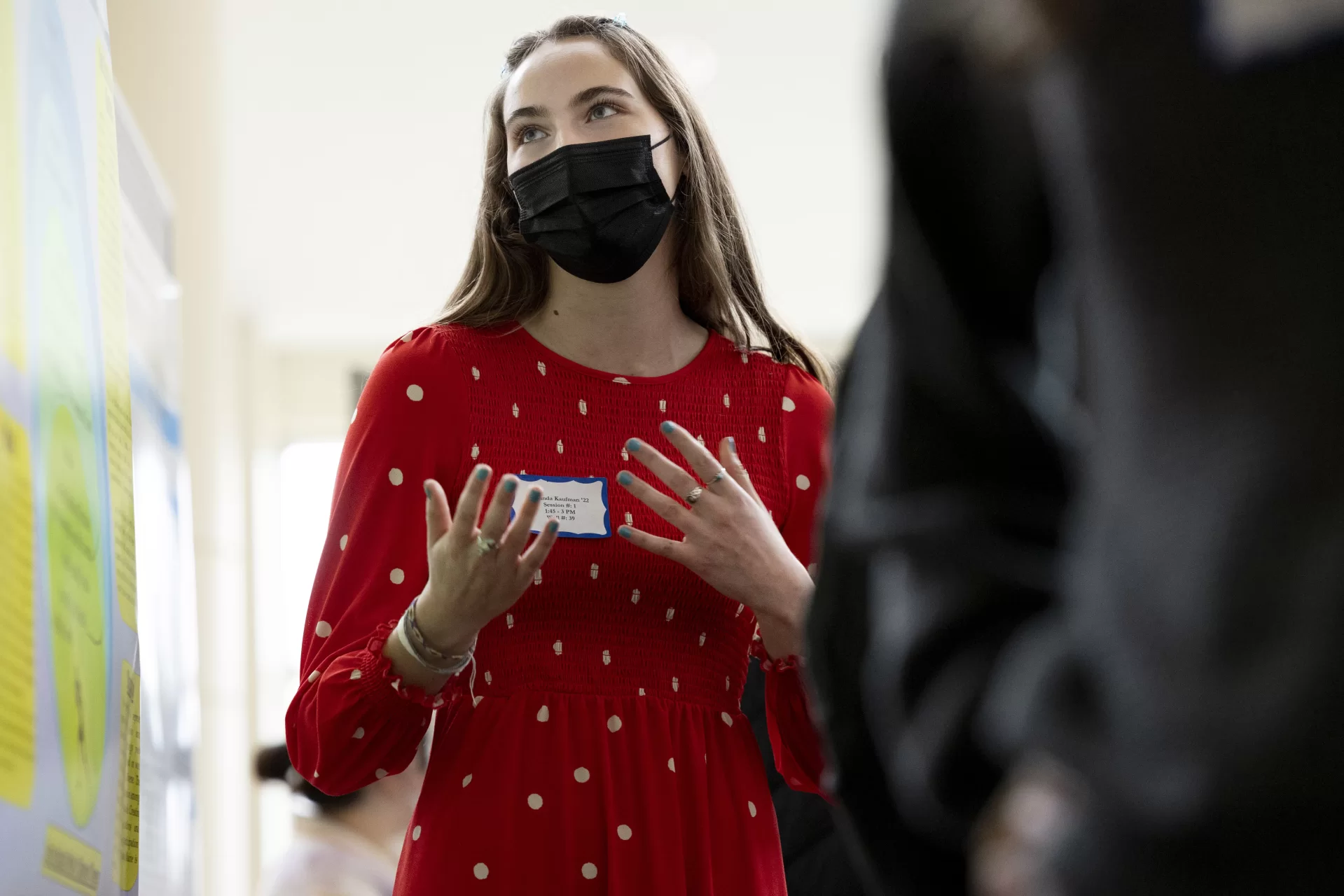
Kaufman talks about her project, which looks at the positive impact of sports in the lives of women and girls in Maine.
“Female mentors and role models was a big theme of my findings, whether idolizing the Olympics gymnastics team or having a really influential coach,” she said.
2:27 p.m. Awe shucks
Two photos on a poster caught our attention as we navigated the sea of posters. One was a black and white image of philosopher and writer Ayn Rand. Alongside it was a dazzlingly colorful image of the northern lights in action.
The juxtaposition was intentional and reflected psychology research by Alix Zabin ’22 of Milford, Conn., on that feeling of “wonder and amazement” known as awe.
For her project, she recruited over 222 study participants and asked half to watch an awe-inspiring video of expansive nature scenes, including the northern lights, as presented in the BBC TV show Planet Earth.
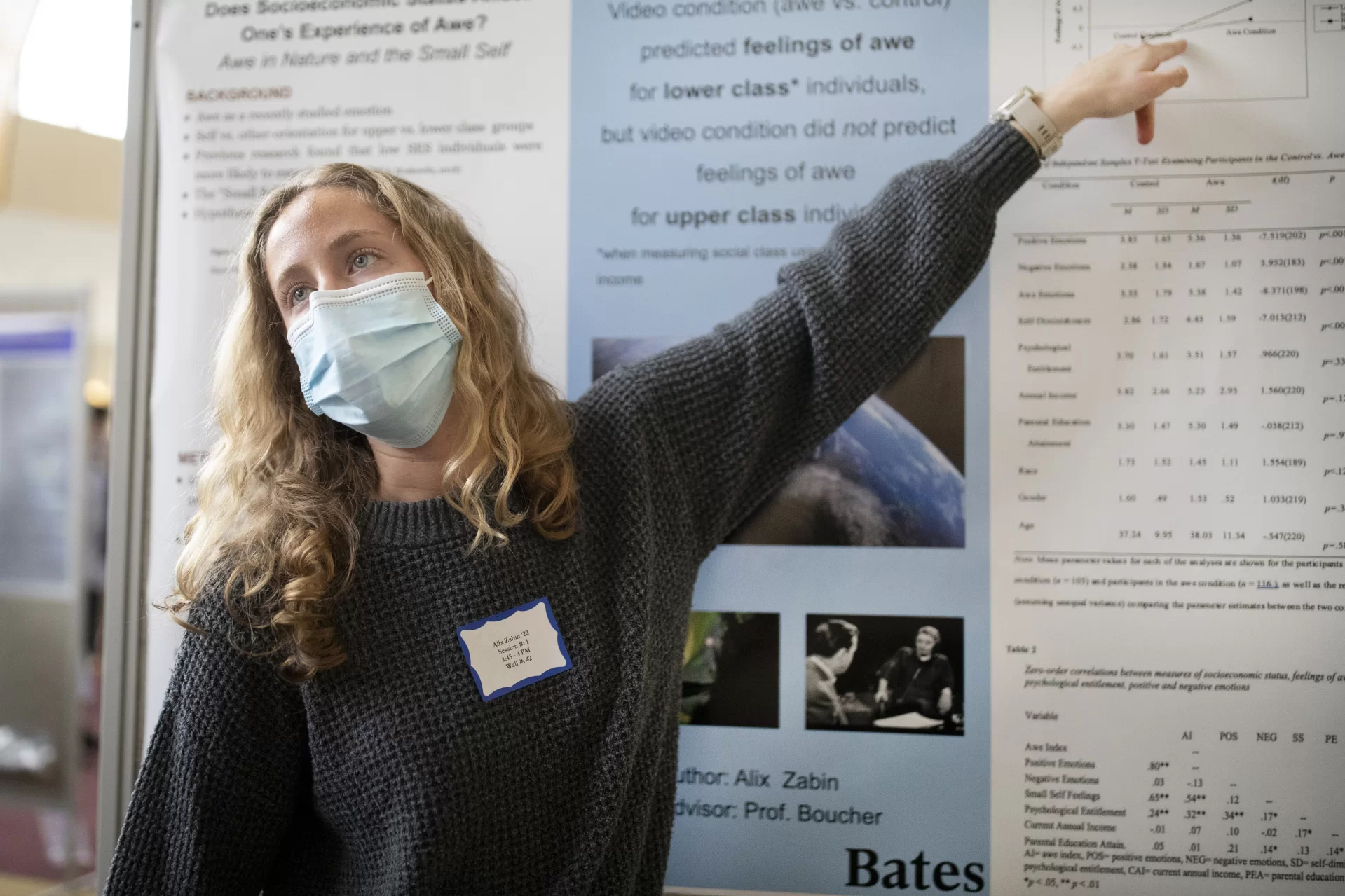
The other half — and this is where Ayn Rand comes in — were assigned to the control group. They watched a far less awesome video, of Mike Wallace interviewing Rand in 1959. While the interview has interesting moments, its overall effect is indeed aweless: a black backdrop, Wallace chain smoking, and Rand’s relentlessly flat-toned Russian-inflected voice defending her ideas about objectivism.
In fact, Zabin says, the two videos — the clip from Planet Earth vs. Ayn Rand — have been “pitted against one another” by other researchers who measure feelings of awe.
Zabin’s study looked specifically at whether our socioeconomic status can affect our experience of awe. (Socioeconomic status was measured through anonymous, self-reported information.)
What she found was that, regardless of socioeconomic status, participants reacted about the same to the Rand interview: no significant feelings of awe. No surprise there.
But participants who watched Planet Earth video report different levels of awe depending on their socioeconomic status. Those with a lower status reported greater feelings of awe compared to the control group who whatched the Rand interview. However, participants with a higher status did not show an increase in feelings of awe compared to the control group who watched the Rand interview.
Just why upper-status and lower-status viewers might react differently to an awe-inspiring video is not yet known. Could it be, as someone said to Zabin, that wealthier folks have the resources to have more awe-inspiring experiences, which have blunted their appreciation for a simple video? As they say, the answer might be a topic for future research.
1:53 p.m. Roads more traveled
The opportunity to tell an untold story inspired a distinctive — and colorful — senior thesis in history.
Speaking as part of a panel discussion in a Pettengill Hall classroom, Maya Benziger, a triple major in music, history, and politics from Aurora, Ill., ticked off three reasons for wanting to create a graphic novel, illustrated with her own watercolors, as part of her thesis work.
First, she wanted to create something that would be accessible beyond the academic community, “something I could bring to my local elementary school,” for example. Second, she wanted to present a slice of history by highlighting material culture, a physical thing.

Finally, she says, “I wanted to tell a story — something human and relatable and connectable,” especially a story that might illuminate the experiences of women, since “histories of women are often rather invisible.”
The result is a 24-page graphic novel featuring Benziger’s watercolor illustrations that tells a story of a single Sassanid-made glass bowl as it travels across Eurasia along the Silk Roads — yes, plural — which she describes as the “movement of people, goods, and ideas” — including religion, trade, and warfare.
Benziger’s thesis also includes a companion text, an academic presentation of her historical arguments about the Silk Roads, including how interpretations of the trading networks were initially framed through a Western lens, and how historians need to untangle what that means.
Historians have presented the concept in the singular, as a single connector between the Western world and the Middle East and Asia. Benziger and others now disagree: “The Silk Roads weren’t a connection, but instead the lifeblood of Eurasia.”
Benziger estimates that her thesis represents over 500 hours of work. Like other seniors who’ve dug deeply into their topic, Benziger realizes much more digging could be done. “I’ve only scratched the surface.”
Another of her takeaways is her “massive, newfound appreciation for the work of both historians and artists.” And a third takeaway: “It was fascinating!”
1:55 p.m. Recovery friendly
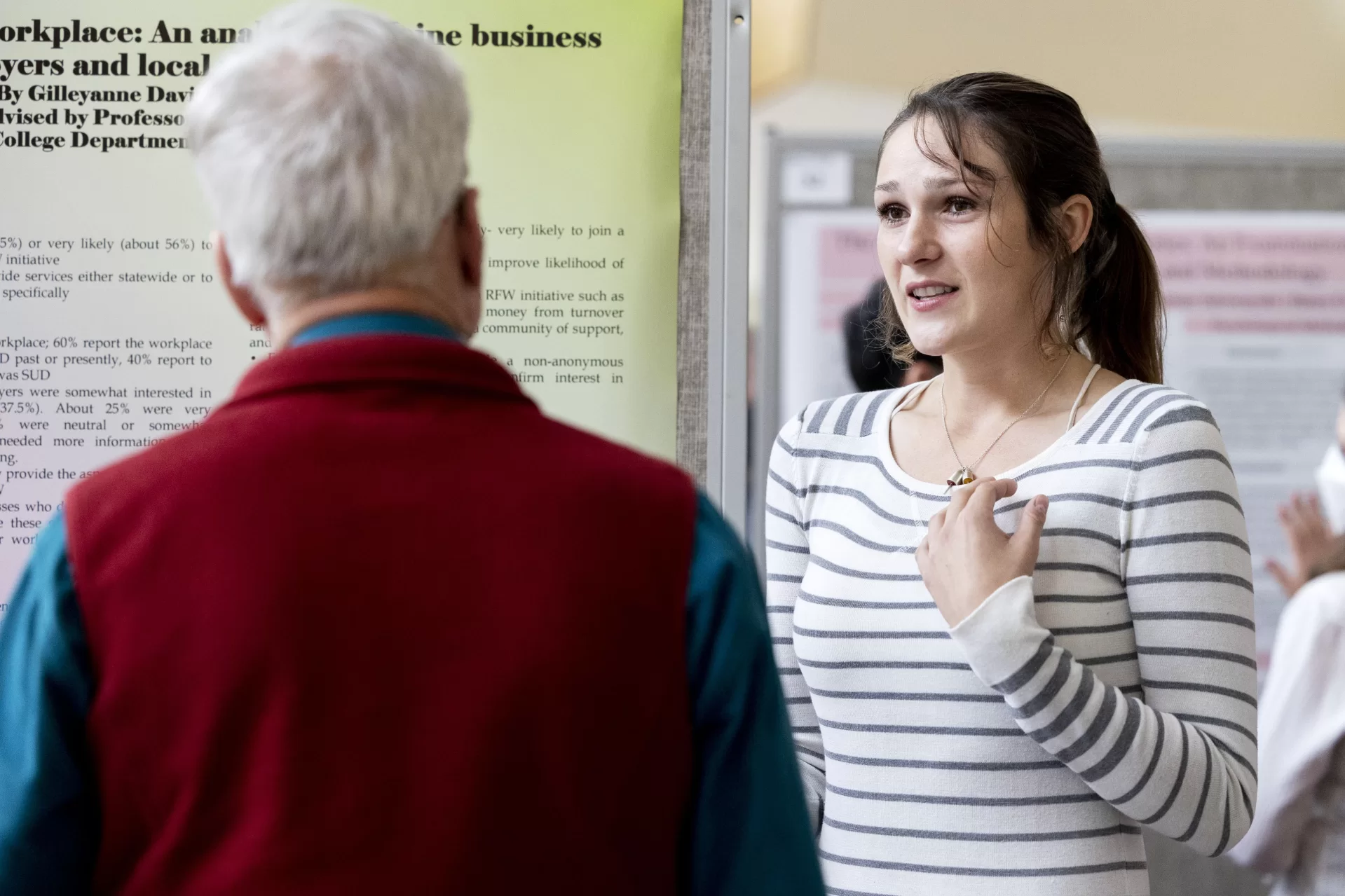
Gilley Davis-Oakes ’22 of Vinalhaven, Maine, talks to Bruce Hall of the college’s Information and Library Services staff about her project, looking at a Recovery Friendly Workplace initiative that originated in New Hampshire.
The idea of RFWs is to “support their communities by recognizing recovery from substance-use disorder as a strength and working directly with people in recovery.”
RFWs encourage a healthy and safe environment where employers, employees, and communities can collaborate to create positive change and eliminate barriers for those impacted. Davis-Oakes conducted surveys that sought to measure opinions about creating a potential RFW in Androscoggin County.
1:59 p.m. Face-to-face
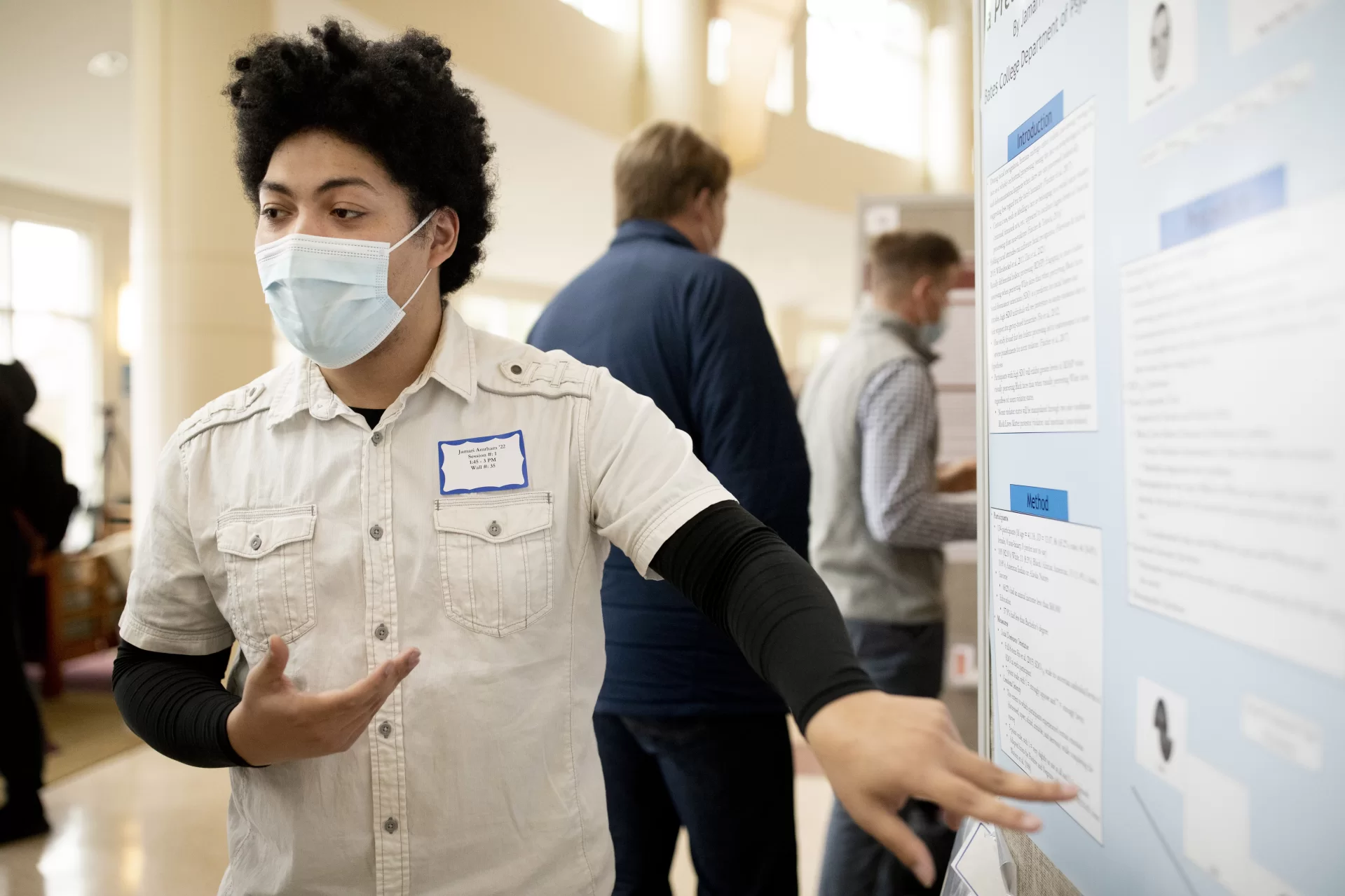
Jamari Amrham ’22 of Winchester, Calif., presented psychology research on the notion of dehumanization, where social biases, including racism, interfere with human’s holistic ability to easily recognize human faces from non-faces.
2 p.m. Take a stance
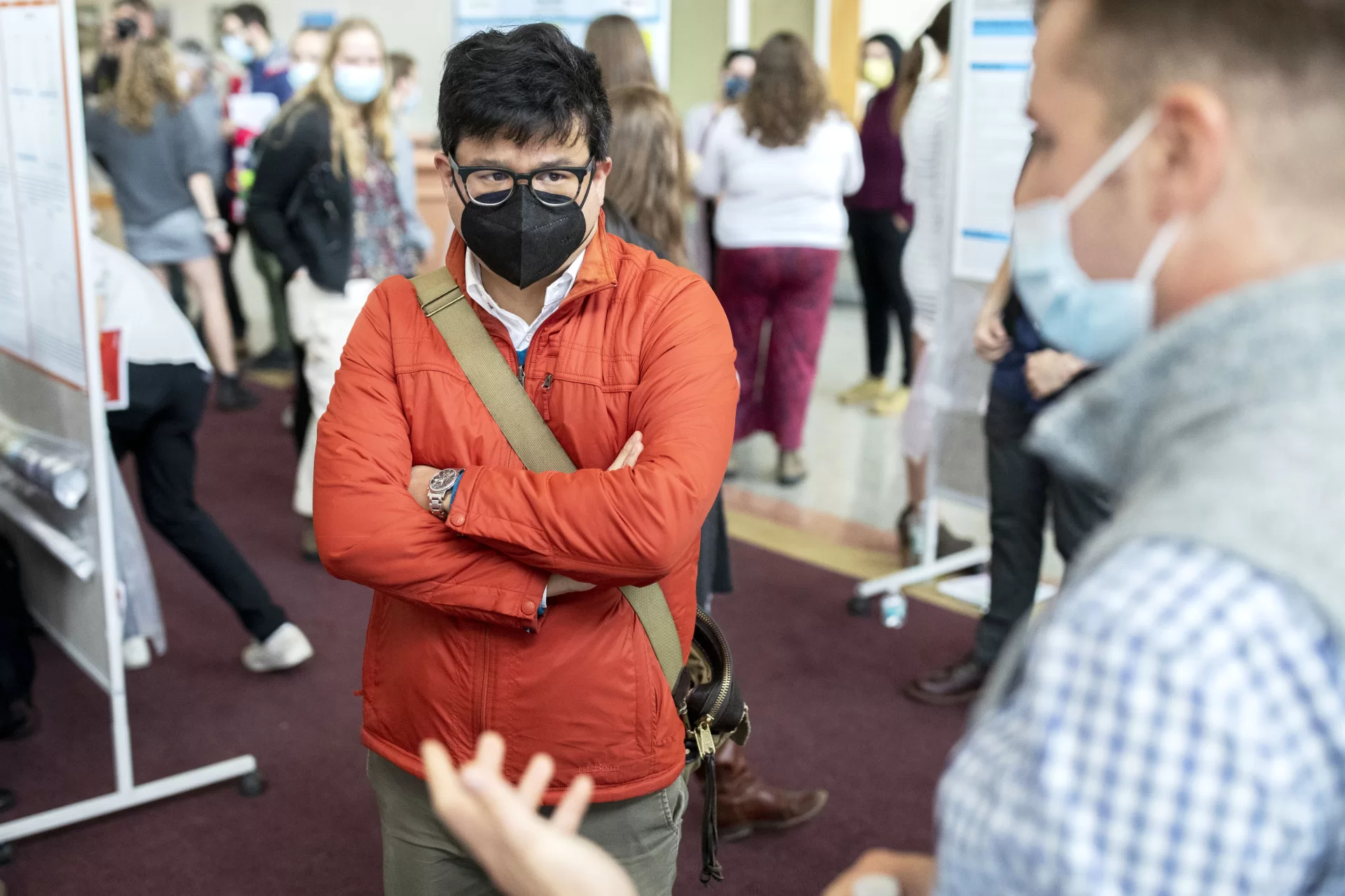
For audience members at Mount David Summit, job No. 1 is to listen, as Associate Professor of Physics Jeffrey Oishi vividly demonstrates in posture and gaze during the poster presentations in Perry Atrium.
2:02 p.m. Atomical frustration
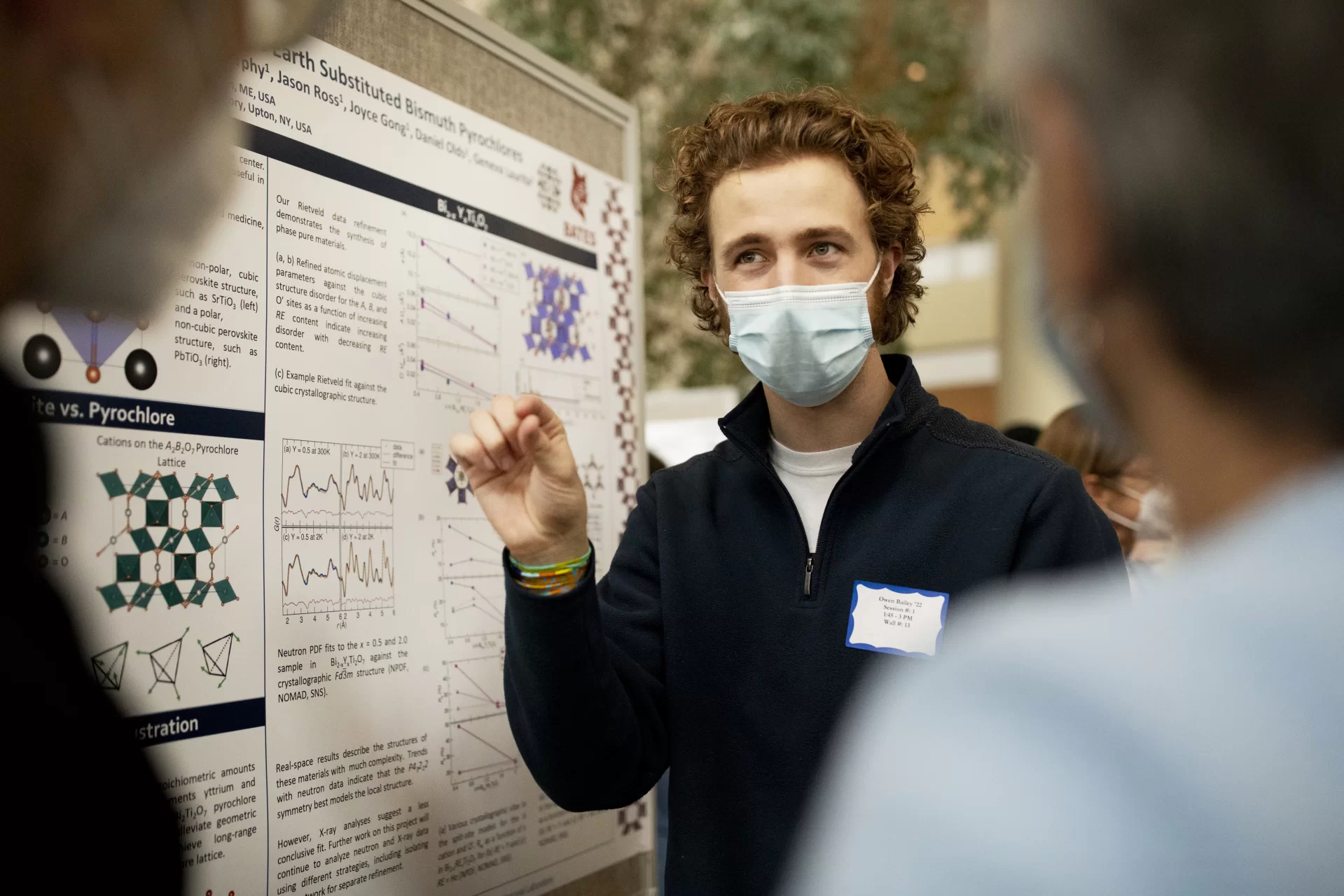
Owen Bailey ’22 of Concord, Mass., presents his chemistry research on “Compositional Control of Local and Long-Range Polarity in the Frustrated Pyrochlore System Bi2-xRExTi2O7 (RE = Y, Ho).”
Did the word “frustrated” catch your eye in Bailey’s title? It did ours. “Frustrated” or “frustration” describes the atoms in relation to their neighbor, which becomes “frustrated” when they cannot move in simultaneous directions.
2:12 p.m. See and be seen
In the hallways of Pettengill’s first floor and second floor, community members could take a look at images from the annual Barlow Off-Campus Study Photo Exhibition.
Inside various classrooms, panel discussions took on an array of topics.
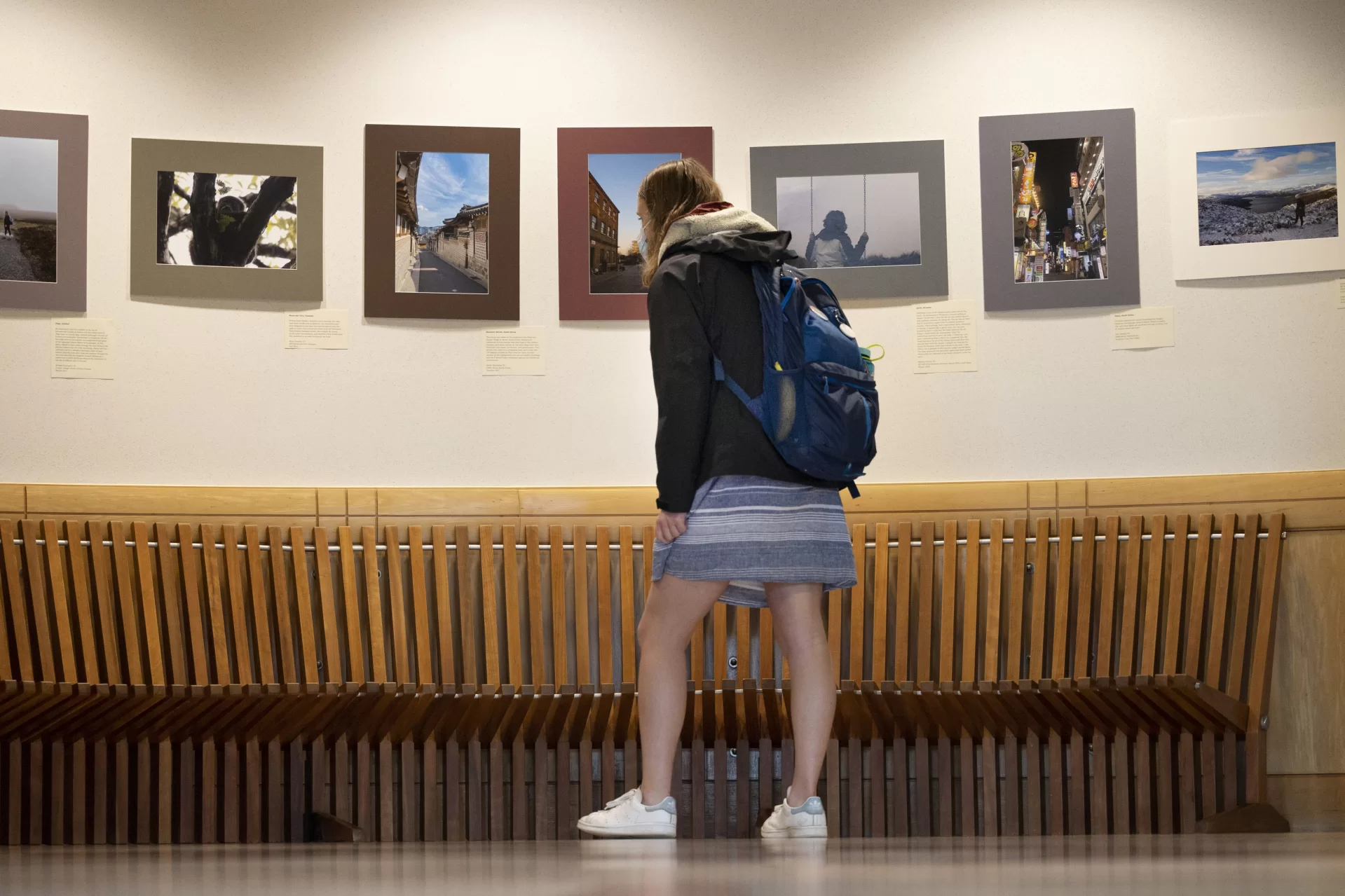
In a ground-floor classroom we found Eben Cook ’22 of Wallingford, Conn. He’s been a fan of rap since middle school. He loves the storytelling nature of the genre and he appreciates the diverse perspectives in the rap scene. Unfortunately, rap has a bad reputation, which is rooted in racism, he explained during a sociology panel discussion.
“Rap was born in the 1970s in the Bronx. Black and brown communities would throw block parties and they would symbolize resistance to oppressive government forces,” says Cook. The genre quickly became popular, and attracted other listeners.
Along came the formation of stereotypes, generalizations, and misconceptions, like the idea that rap music perpetuates and incites violence among its listeners, and that rap music encourages and leads to misogynistic behavior.
“Although there are violent and misogynistic themes that occur in rap music,” says Cook, “it makes incredible generalizations that are not made about other genres that are historically viewed as white, such as country and folk music.”
Those stereotypes bleed into other areas, like policing, and create a cycle of punishment, says Cook, but his sociology thesis proposes that listening to rap intentionally in class can help students combat those biases, and affirm their own identities.
2:23 p.m. Kinder thoughts
Visiting Assistant Professor of Psychology Su Langdon is nodding along enthusiastically as Lily Kinder ’22, a neuroscience major from Pike, N.H., explains her poster subject, “Perseverative Thinking in Relation to Guilt, Motivation and Subclinical OCD.” Kinder is enrolled in Langdon’s sports and psychology course, although her research stems from the fall semester.
Meanwhile, the summit is filled with other students of Langdon’s.
“I’ve got my seminar students over there and then two are about to speak and then six are coming to posters,” Langdon tells Kinder, referring to the poster sessions throughout the day.
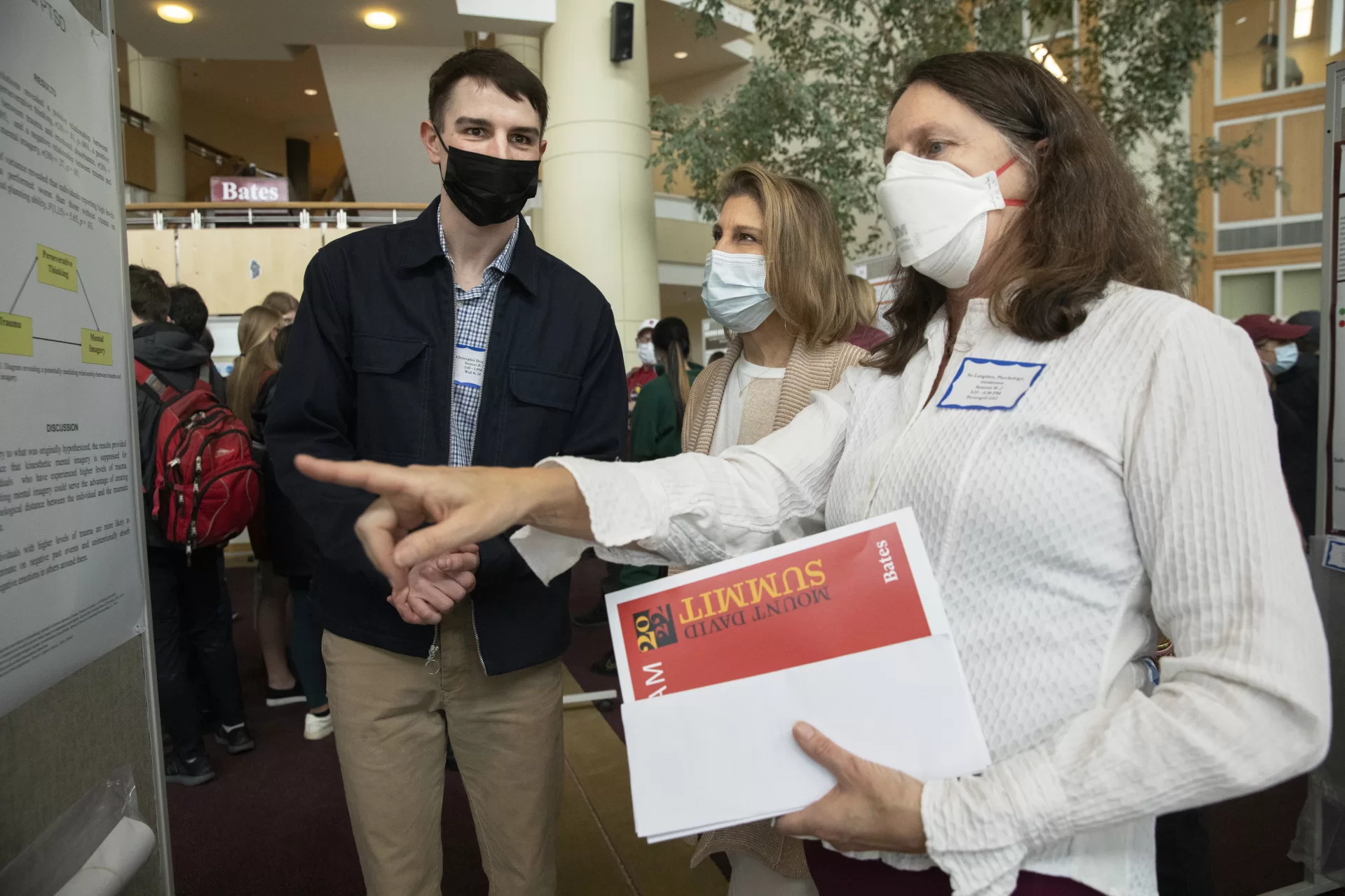
Kinder surveyed 32 student athletes about their relationship to their sport. The ones who reported higher levels of “perseverative” thinking (repetitive and negative thoughts often associated with obsessive compulsive behaviors) reported strong fear of guilt — the dread that one’s behavior may become misaligned with one’s ethics.
In contrast, those with lower levels of perseverative thinking showed increased motivation to engage in athletics, a feeling of competence through sport and a greater ability to socialize with others. The core of Kinder’s findings are that less perseverative thinking may allow athletes more cognitive resources in order to extract greater value from athletic participation.
Langdon gives Kinder’s work a big thumbs up. “Very cool! Congratulations.”
“Thank you so much,” Kinder says. “Actually the last time I came to Mount David I was a prospective student. So it’s kind of full circle.” And that last time? It was “daunting” to see all the high level work being shared. Now it’s her turn to present challenging work that probes the complexities of the mind.
“I’ve been telling all of the juniors, just go,” Langdon tells her. “It’s just so helpful to see it, even if you’re not sure what the words mean.”
“For sure,” Kinder says, laughing with her. “I’m thankful I came at that time.”
2:31 p.m. Timing their way
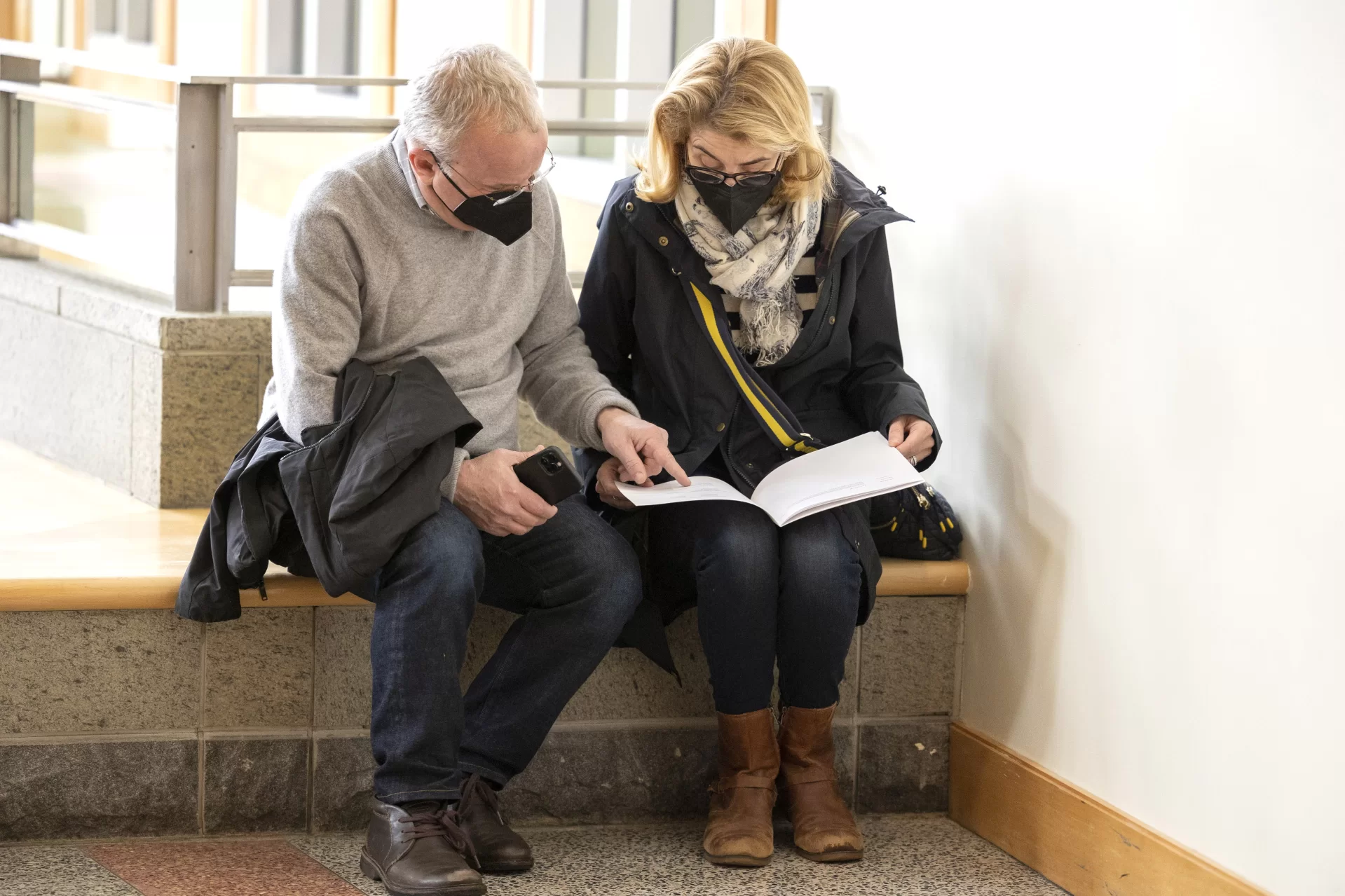
Bates parents Jim and Wendy Paul check the summit schedule. Their daughter Syd Paul ’22 of Wellesley Hills, Mass., was part of an economics panel on carbon pricing, “Fat Tails and Tipping Points.” Fat tails is a statistical term referring to probability distributions with relatively high probability of extreme outcomes.
2:35 p.m. Making memories
“How would you define memory?” asks Andrew Hall ’22, a neuroscience major from Little Silver, N.J. He’s one of the team of students who continue to explore the possibilities for Bobcat 339, the molecule invented in 2017 by Assistant Professor of Chemistry and Biochemistry Andrew Kennedy and his student researchers.
Trick question?
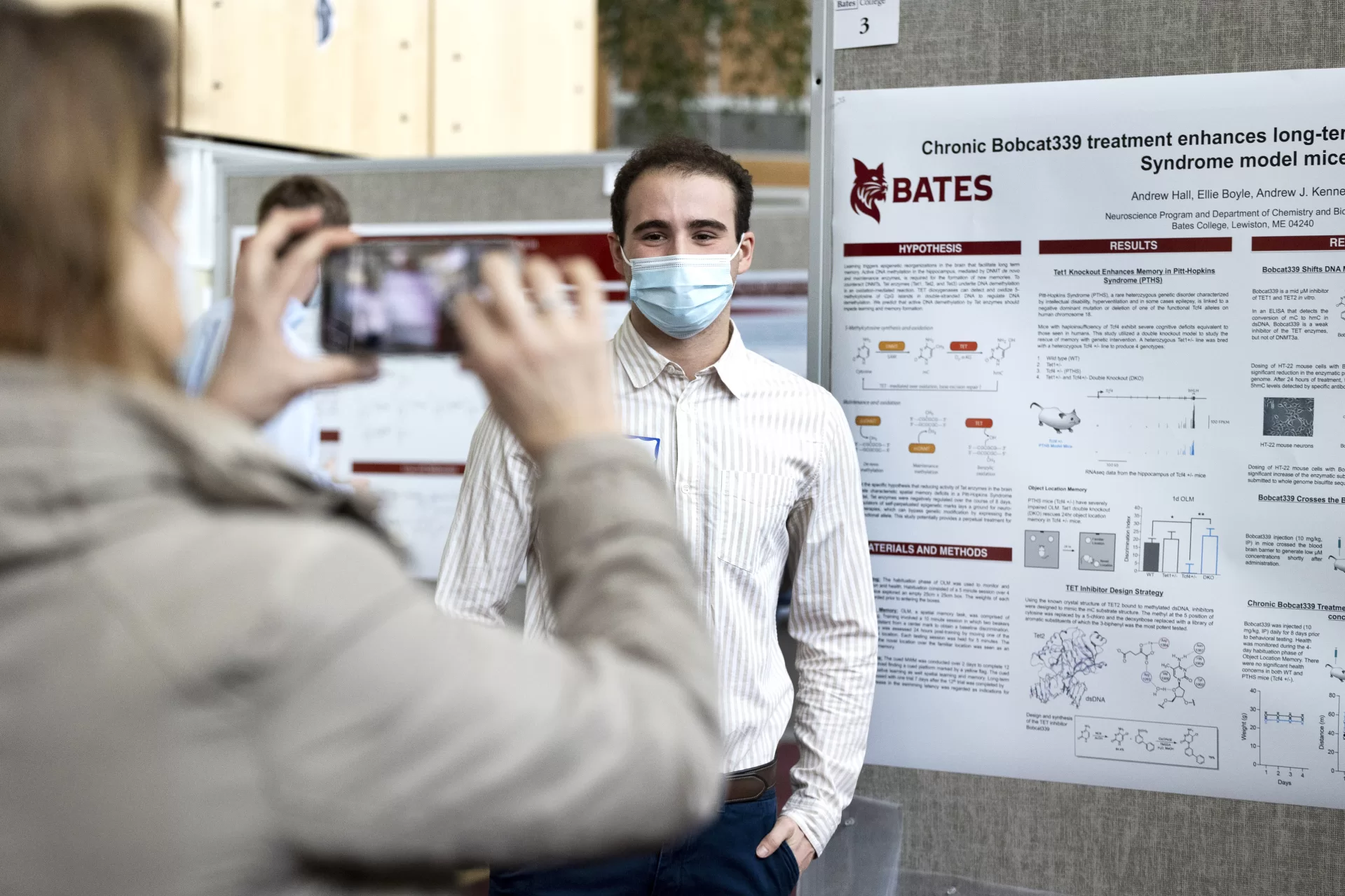
“You don’t have to answer,” Hall says, sensing he’s got a Bobcat339 rookie in front of him. “Just think about it for a minute.”
Got it. His listener does remember that the Bobcat339 molecule has the potential to govern the function of genes, including those related to memory loss.
“When we experience things and form a memory,” Hall says, patiently trying to make the science make sense. “It is actually placed onto our DNA. Encoded onto our DNA.”
From there Hall goes into a deeper explanation of the work he did in Kennedy’s lab, trying to inhibit memories from being made in some mice to see whether Bobcat339 could counteract that inhibitor. The hope is that ultimately, Bobcat 339 might become a pharmaceutical tool to help people with memory impairments, like Pitt-Hopkins Syndrome, a severe genetic condition whose effects include impaired memory function, by interfering with the workings of a certain gene, TCF4.
The results, Hall says, were “a little mysterious, but still promising:” Bobcat 339 helped over a seven-day test period, but not immediately. That promise — though not what he or his professor expected — and the lingering questions represent the nature of research.
2:42 p.m. Hug and Hello
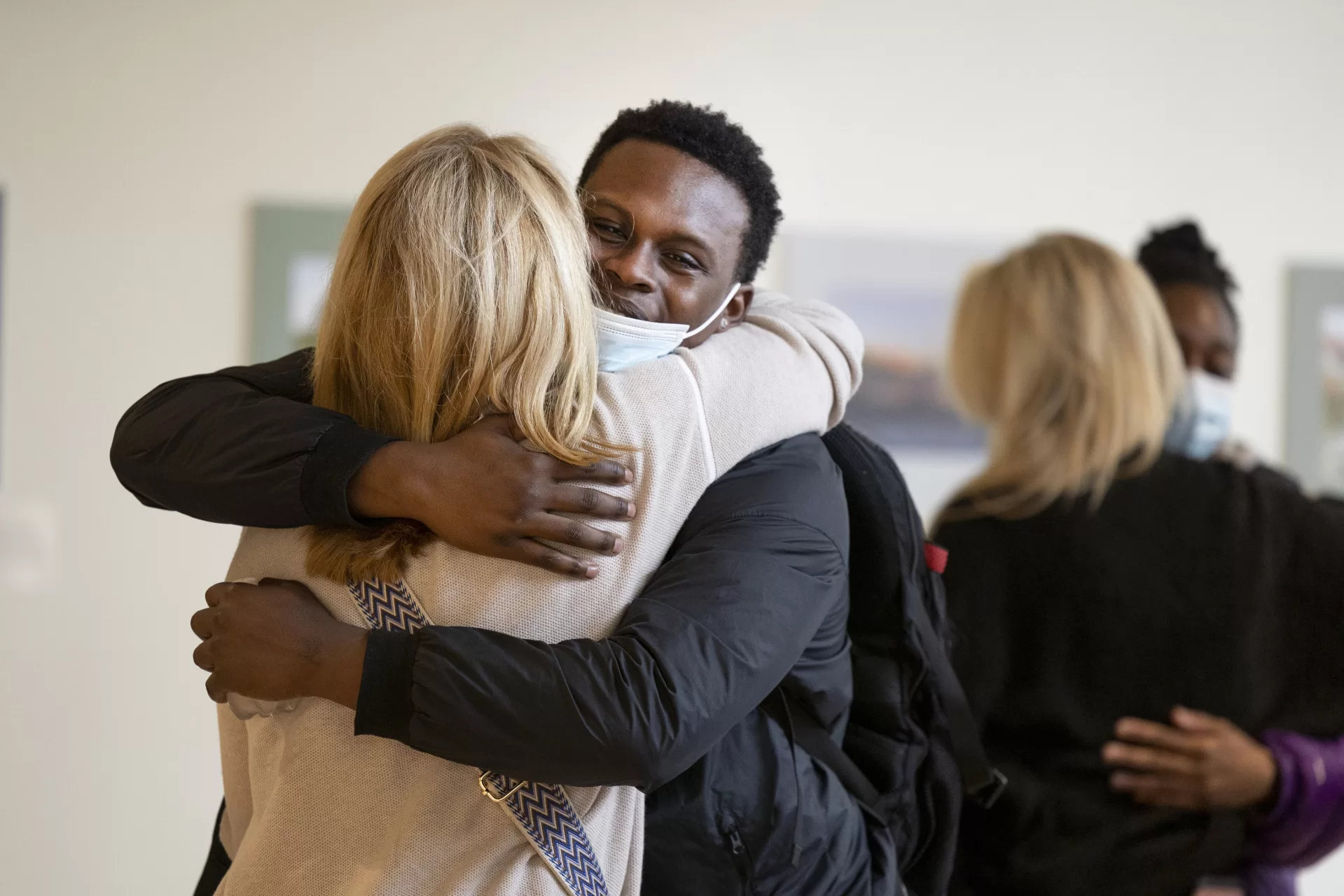
George Hawkins ’22 of Jacksonville, Fla., gets a hug from Tammy Martin, the aunt of Ari Dahlia ’22 of Brick, N.J.
2:52 p.m. Seeking help
“Honestly it really exceeded my expectations for how many responses I got,” says Ben Conner ’22 of Huntington, N.Y., gesturing toward the numbers on his poster, “The Effects of the COVID-19 Pandemic on the Need for Help-Seeking Among BIPOC Students.” He surveyed 297 self-identifying BIPOC participants who were at least 18 and attending either college or university.
With under eight minutes to go on the day’s first poster session, the psychology major is explaining the happy discovery that made the data of his senior project so much richer. Working with Jennifer LaCosse, visiting assistant professor of psychology, he started with a vision of getting maybe 50 to 60 of his fellow Batesies to respond.
But a funding award enabled him to go beyond the campus population, via the survey site Prolific, landing 297 participants. Even with the flake rate — there was a question buried in the survey questions designed to flag those who weren’t actually paying attention— he got more responses than expected.
Conner’s respondents who demonstrated a strong level of race identification scored higher on having negative experiences because of COVID. “But then we found that they scored lower on actually using mental health services.”
Those answers backed up his theories. He started with a hunch based on personal experience. As a BIPOC student himself who avails himself of Counseling and Psychological Services at Bates, his belief was that BIPOC students needed counseling services more than ever.
“We see these greater levels of stress because of the pandemic,” Conner says. “And you know, BIPOC-identifying individuals are disproportionately affected, which makes them more vulnerable to health concerns, which would presumably lead to more help seeking.”
Furthermore the racial tensions that have been such a negative force in the last two years also created more mistrust, which lead to more of the kind of feelings that a mental health professional can help with.
Conner explains that his respondents who demonstrated a strong level of race identification scored higher on having negative experiences because of COVID. “But then we found that they scored lower on actually using mental health services.”
The barriers that keep them away, he says, include stigmas about using mental health services. But another factor is not having access to mental health professionals who look like them.
“I attend CAPS and my therapist is white,” Conner says. He was born in Korea and adopted by an American family. “I love her, like, she’s amazing. But if you look at the CAPS counselors at Bates, there’s one who identifies as a person of color. So then, you kind of see all of the students of color flooding towards her, which just isn’t gonna work, you know?”
Addressing that problem would be a good project for future research, but as the clock ticks toward 3 p.m., Conner is wrapping up his Mount David Summit feeling that his poster project is a success.
3:13 p.m. Closing the gap
How can you make eighth-grade students more interested in a math class? Tess Hick ’22 of Minneapolis figured it out: superpowers.
For her senior thesis in mathematics, Hick worked with a teacher at Lewiston Middle School to co-create and co-teach a math class — but not only about math: She was also teaching them about voting systems, and instead of polling them on say, presidential candidates, she used superpowers as a hands-on example. Which superpower is the best? The winner was invisibility, but by a close vote.
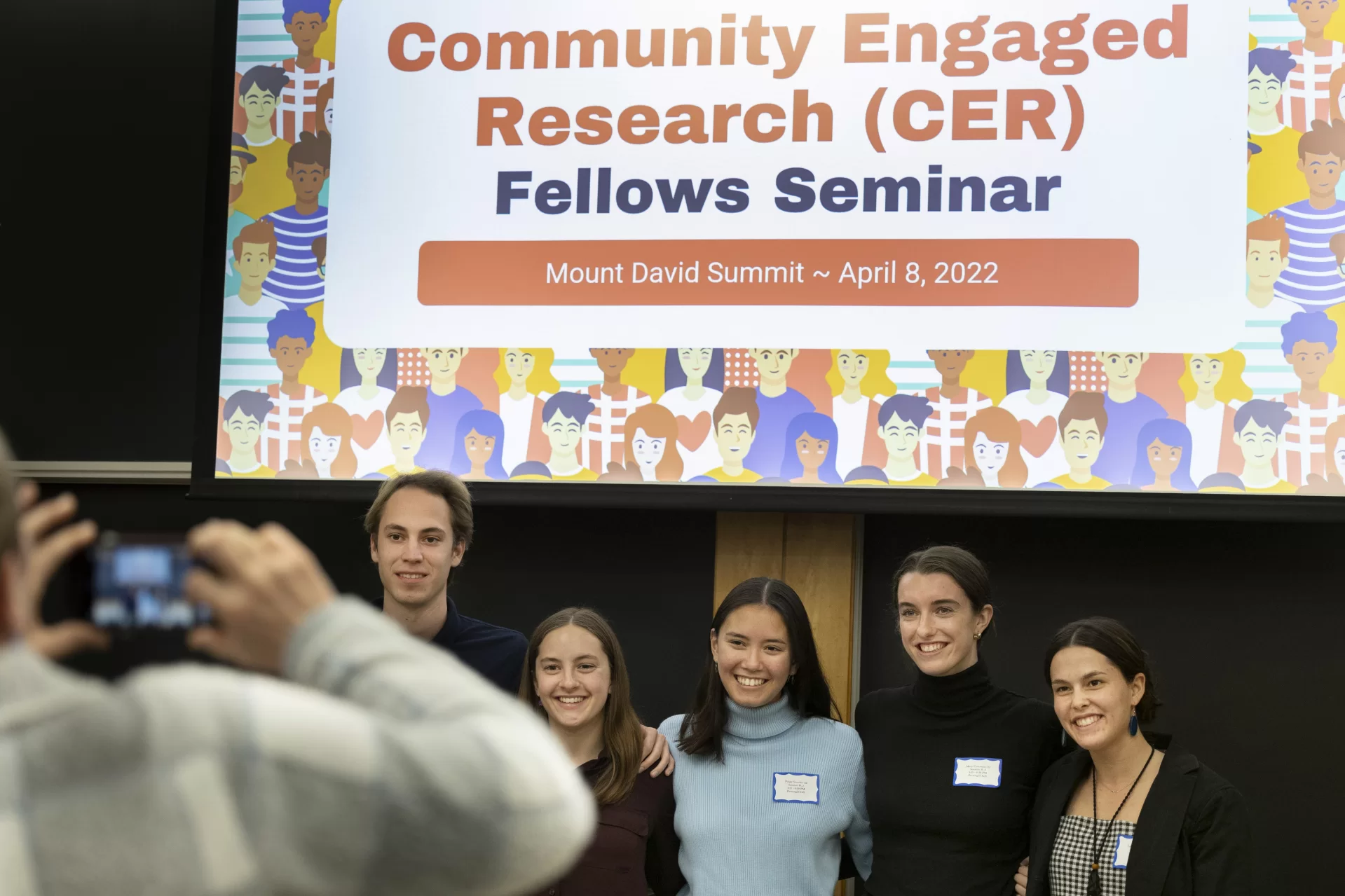
Hick is a Community-Engaged Research Fellow, a program of the Harward Center for Community Partnerships. As a fellow, Hick chose to address the racial mathematics gap that is leaving Black students behind.
“This is what we call an opportunity gap, not an achievement gap,” says Hick. “An achievement gap would mean that it’s the students themselves that are at fault, that they’re not working hard enough to get these scores. An opportunity gap locates the failure where it is, which is in the system to teach these students.”
By using math to examine voting history and current issues, Hick hopes students can take a step toward activism and advocacy, along with learning addition and subtraction.
“Some students were confused as to why there was suddenly so much social studies in math class, but we really did get to have some good conversations about that, about how no issue in the real world is confined to one school subject,” says Hick.
And the class had another benefit: While learning about voting, LMS students decided they wanted future student council elections to be a ranked choice vote, rather than a plurality. The LMS administration accepted their proposal, and next year’s elections will be held with the system that rolled out for state and federal elections in Maine beginning in 2018.
3:51 p.m. Virus alert
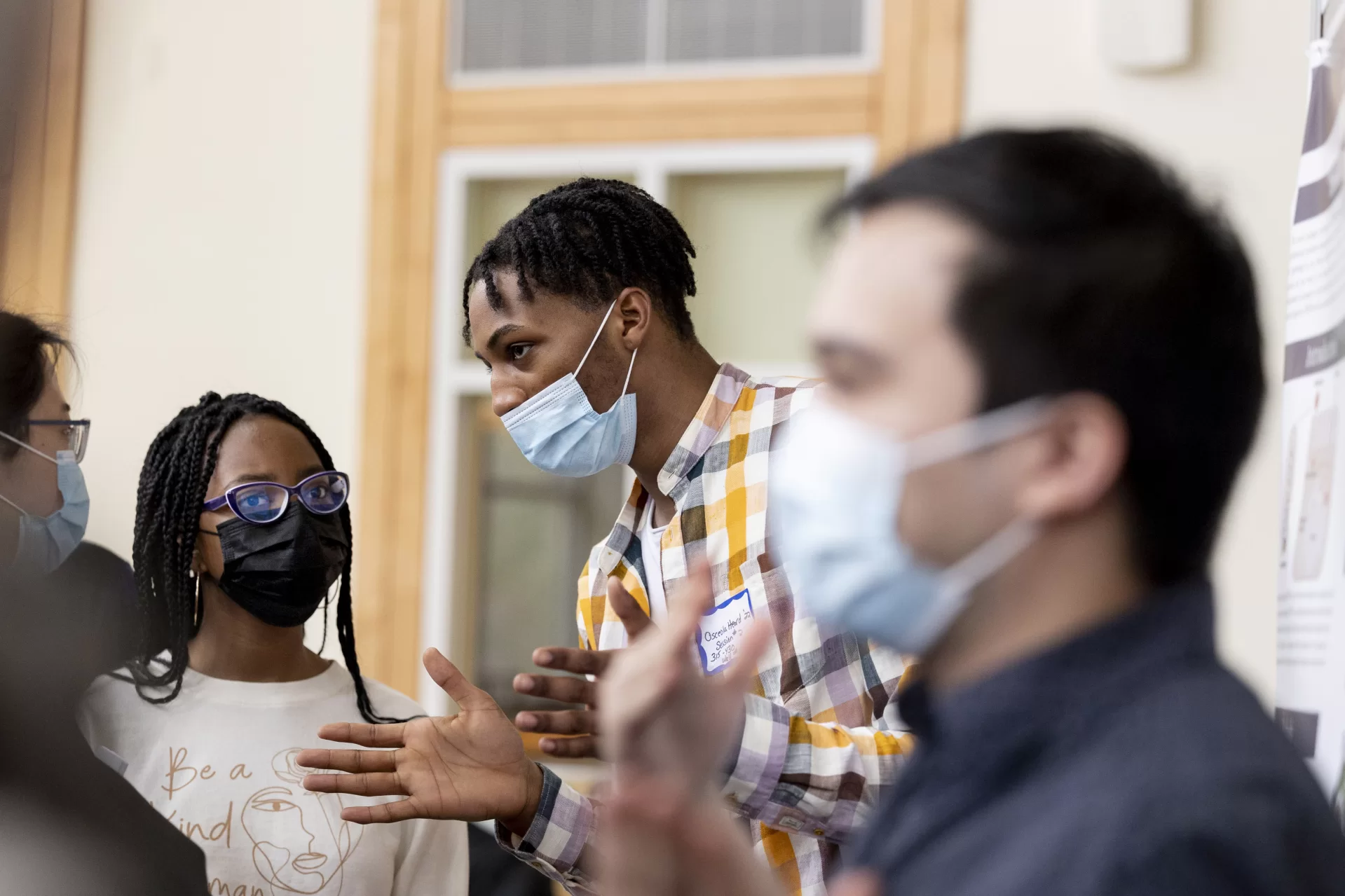
Osceola Heard ’22 of Newark, N.J., explains his biology research.
He looked at an infamous virus, the rotavirus, which infects the small intestine in big ways. It’s a powerful and highly contagious virus, he explains, that employs “a sophisticated replication strategy that also causes life-threatening vomiting and diarrhea.”
Heard’s research is part of ongoing work in the lab of Assistant Professor of Biology Lori Banks to develop new antiviral agents. His project aims to understand key structural regions of a protein known as Nonstructural Protein 4, or NSP4, that is involved in rotavirus replication.
3:52 p.m. High and low
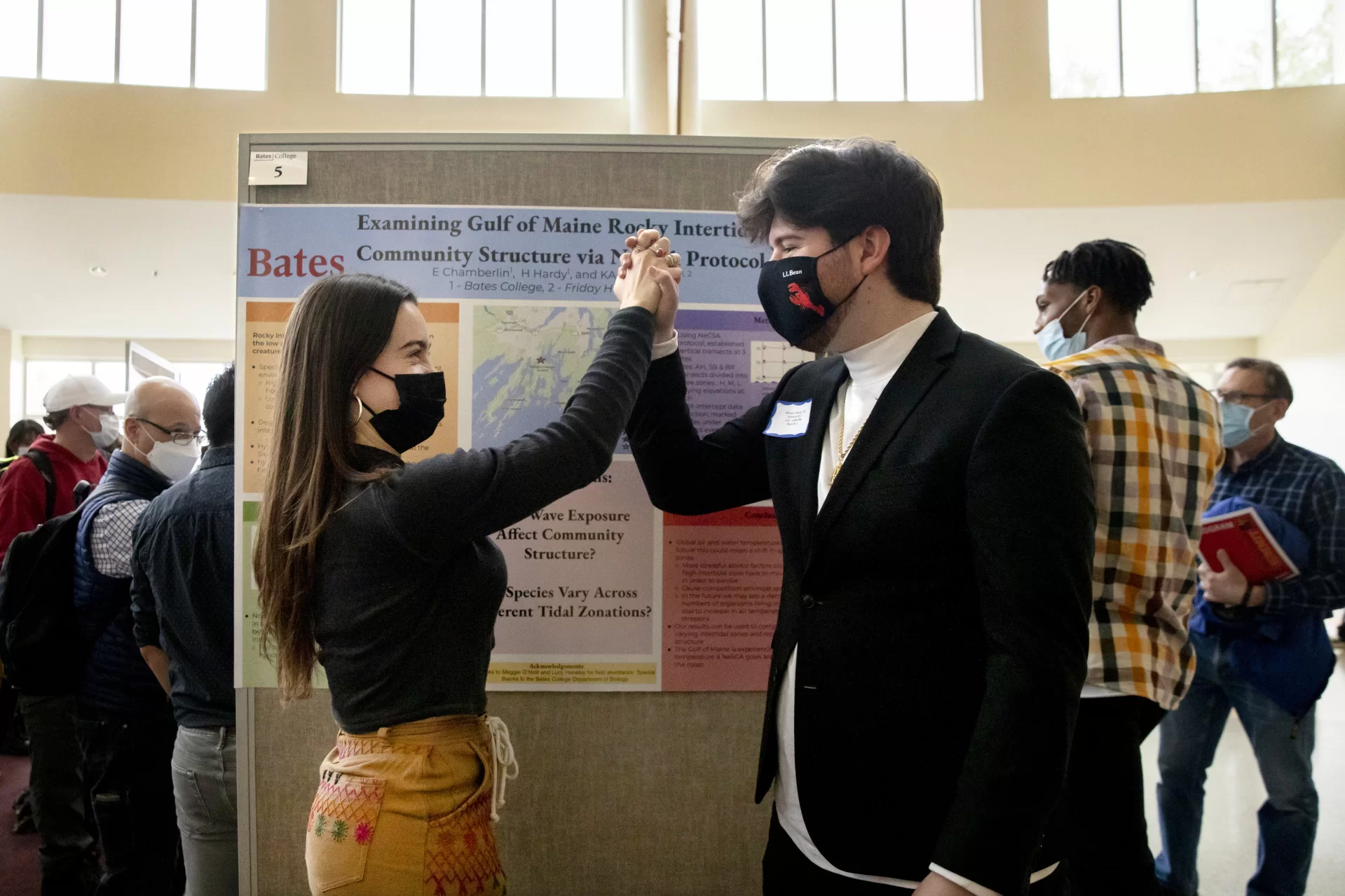
It’s congratulations time for senior biology majors Elene Chamberlin of Brookline, Mass., and Henry Hardy of Gloucester, Mass.
They both worked on a Maine coastal study to collect data on intertidal species diversity according to specific protocols established by the Northeastern Coastal Stations Alliance. The goal is to understand if species diversity and community composition vary by horizontal or vertical location.
Horizontal and vertical refers to different ways of looking at species in certain zones and areas, such as “asking if species diversity vary at high tide, mid tide, and low tide,” said Chamberlin.
4:11 p.m. Happy returns
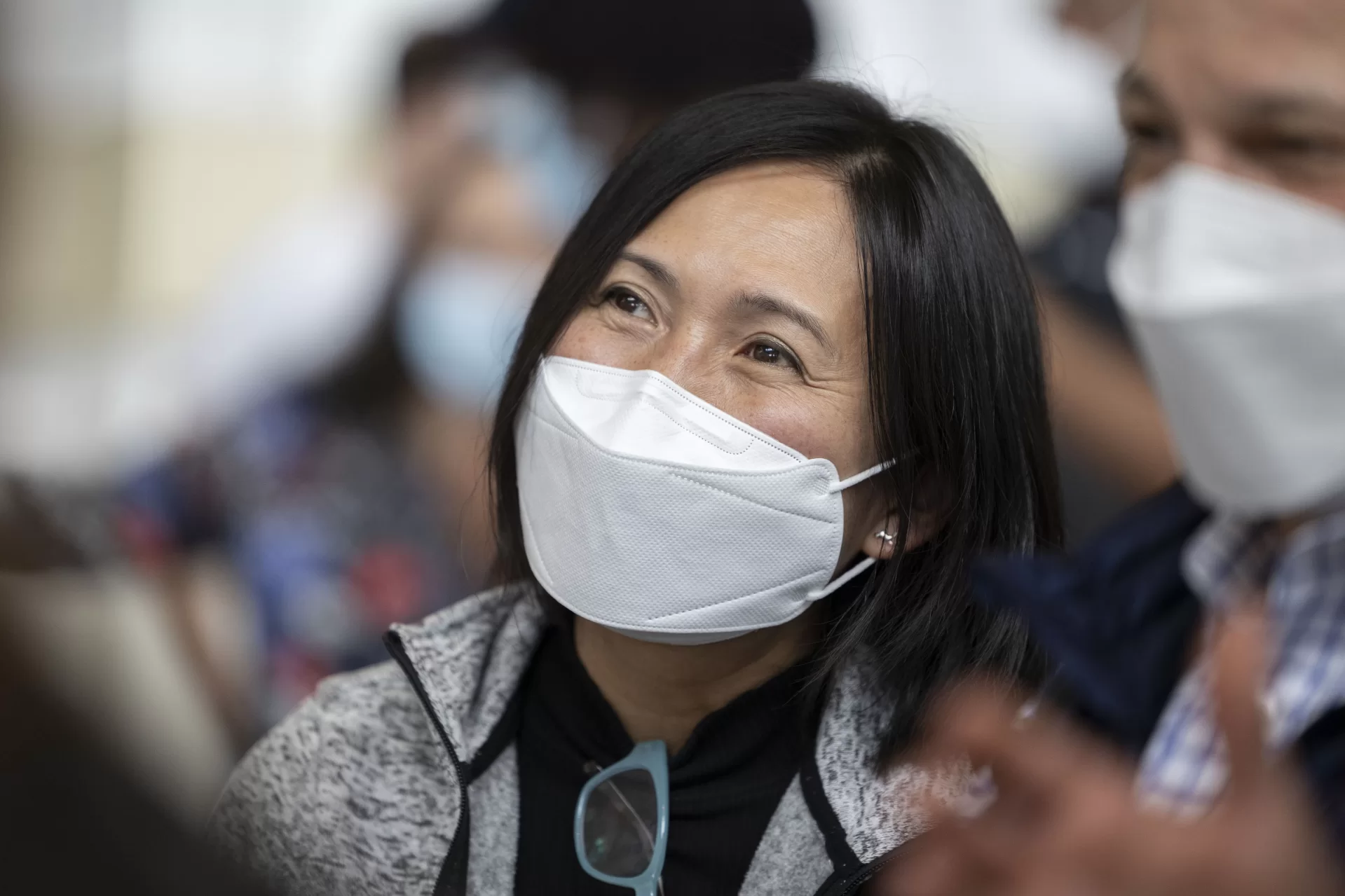
After a canceled 2020 summit, and virtual edition in 2021, being back in person was a hit for Bates parents who’ve had limited opportunities over the last two years to seek their students do their thing.
4:20 p.m. Eye to eye
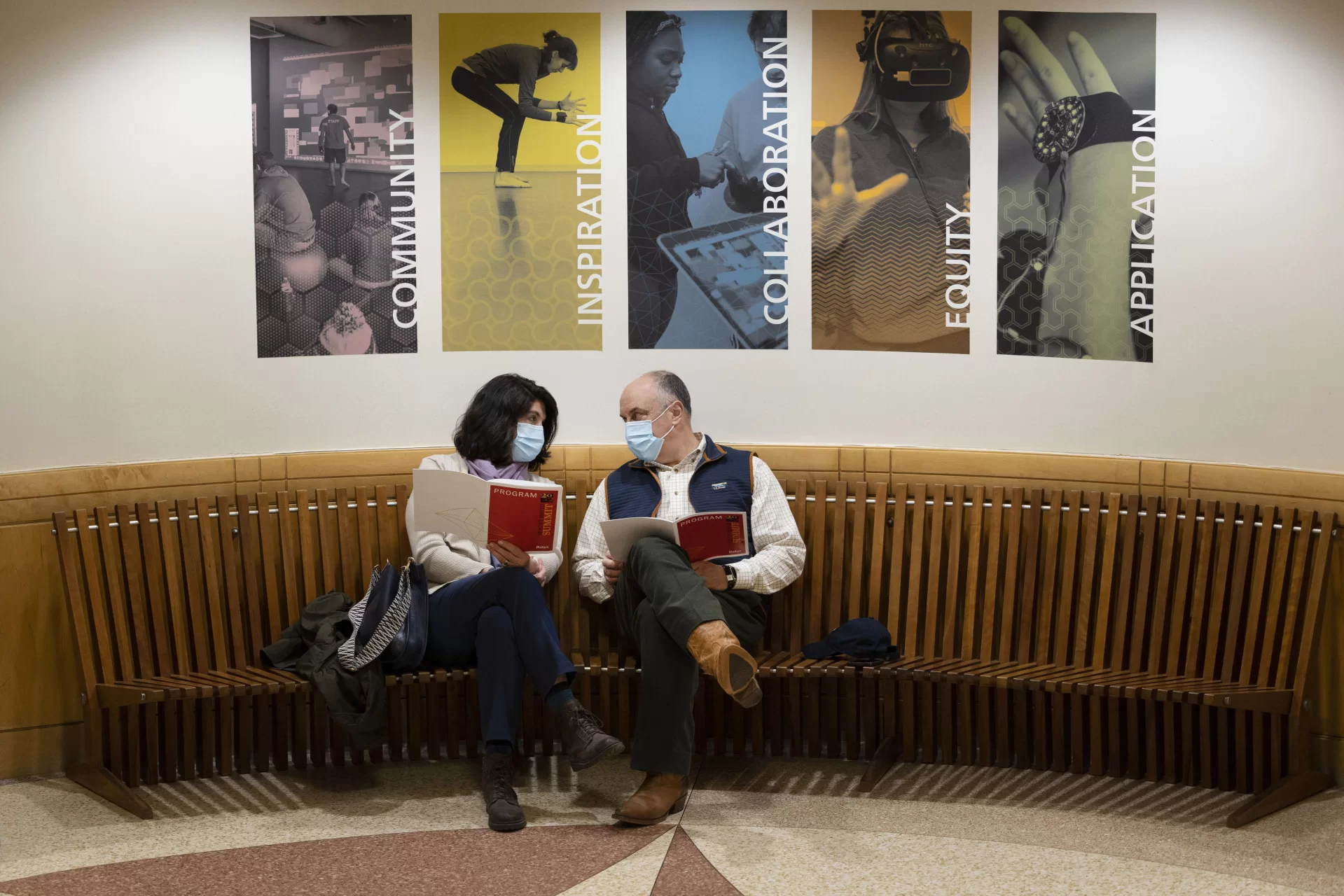
Taking a break on the ground floor Thomas Moser seating are Halsey Platt ’88 and Juliet Sutherland Platt, parents of Alex Platt ’22 of Groton Mass., and Gordon Platt ’19, who take a look at the summit schedule.
Their son Alex took part in a religious studies panel discussion. “Religious Studies at the Cutting Edge: Life and Death, Love and War, Local and Global.”
4:38 p.m. Time for “The Talk”
Susanne McGrady ’22 of Madison, Conn., wants to make it easier for parents to talk about sex — with their children.
“When it comes to society, we have this overarching stigma against talking about sex, which is this overall rejection of sexuality,” McGrady says. The result goes beyond discomfort: sexuality as a taboo subject that “can lead to discrimination” based on sexuality. “We have to combat that at the interpersonal level.”
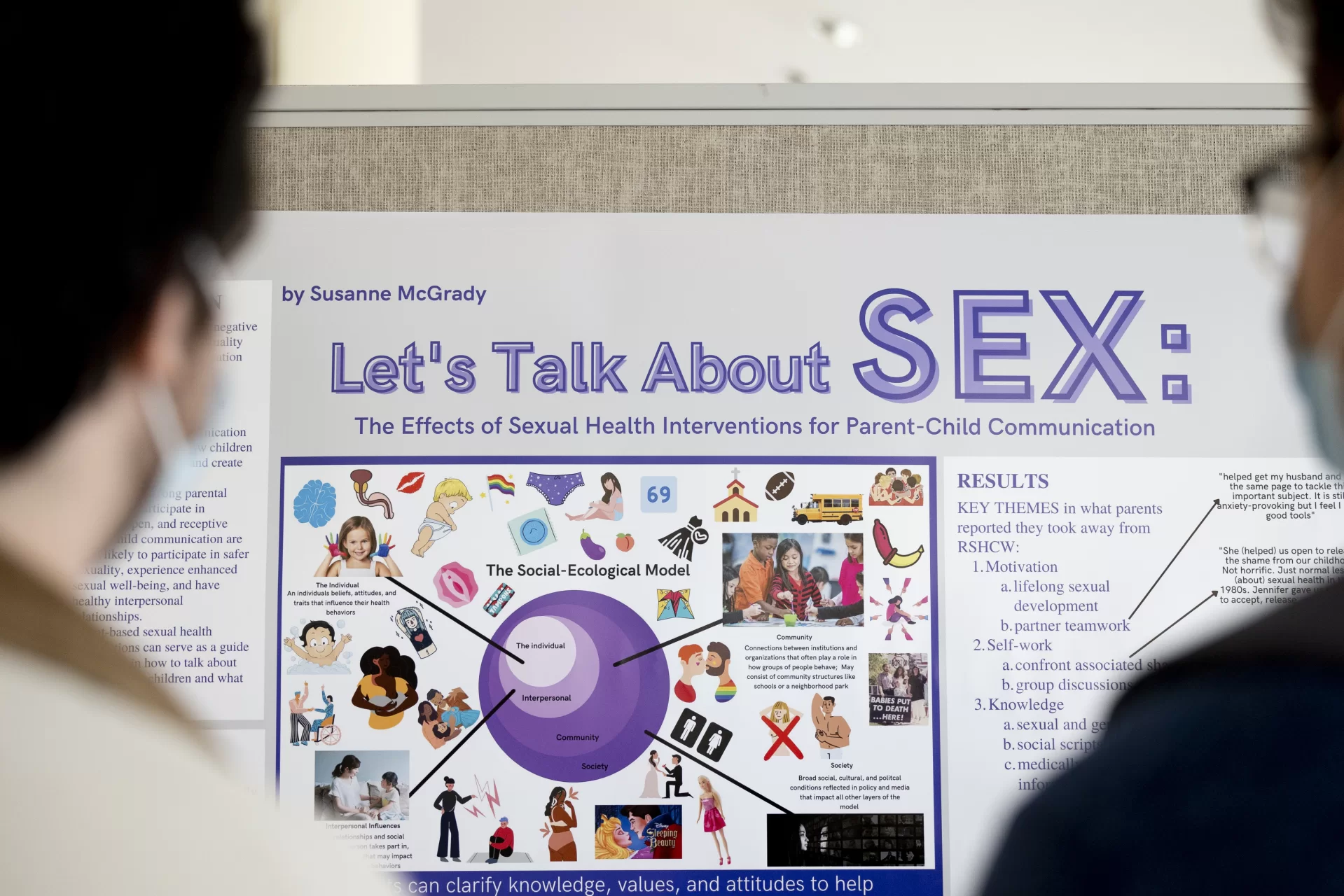
In preparing her psychology thesis, McGrady worked with Jennifer Wiessner, a local clinical social worker and sex therapist. She watched workshops Wiessner held for parents and helped her prepare research and materials for Maine Family Planning’s Annual Comprehensive Sexuality Education Conference, held earlier in April.
“It was a lot of fun to feel like the work I was doing meant something to someone beyond handing in a paper and getting a grade,” says McGrady. “I like knowing that my work will impact the way parents talk to their kids about sexuality.”
4:41 p.m. Sports, women, and media
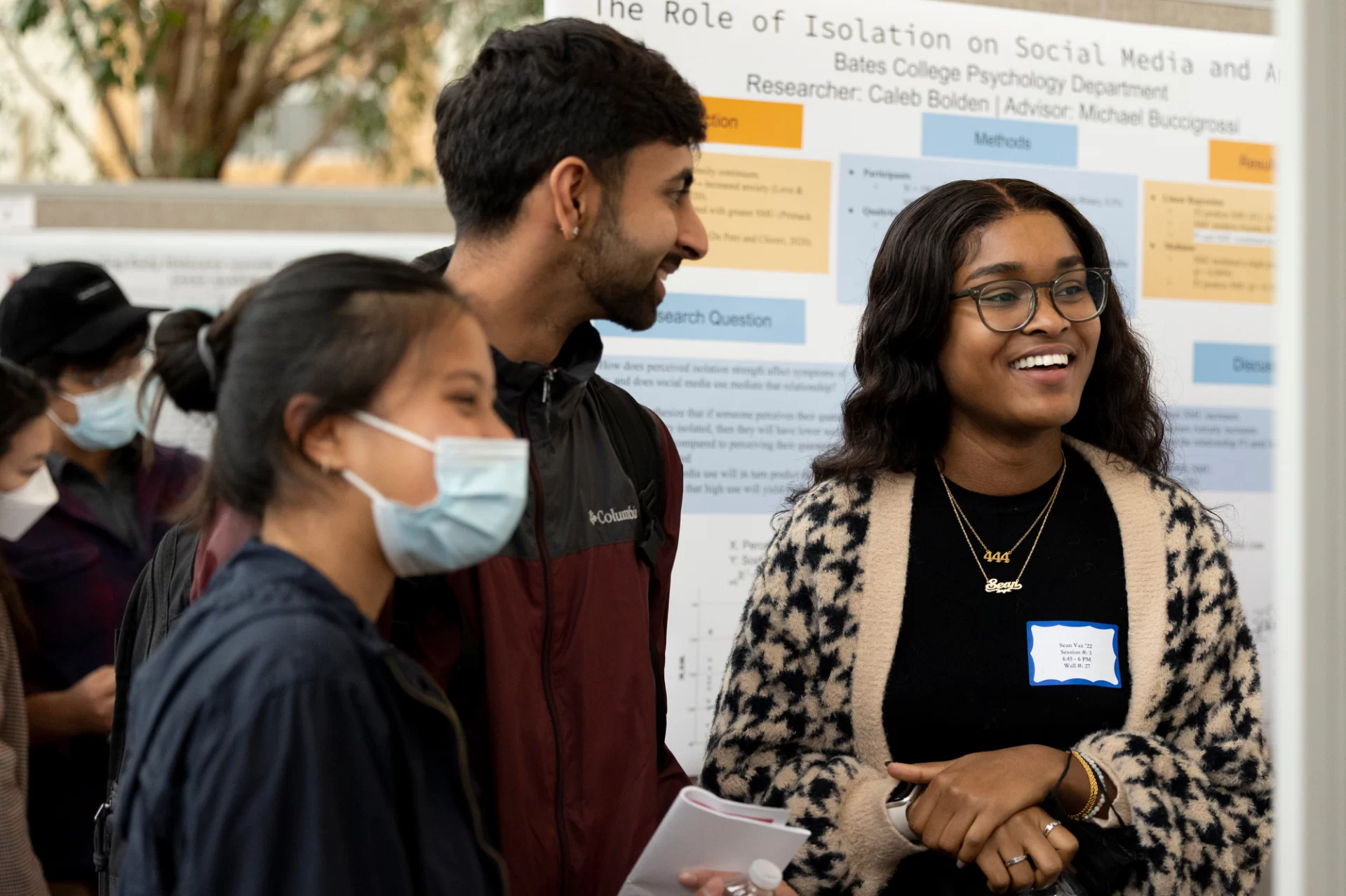
Sean Vaz ’22 (right) of New York City explains her psychology thesis to Rishi Madnani ’23 (center) of Langhorne, Pa., and Risa Horiuchi ’25 of Oakland Gardens, N.Y.
Vaz looked at the media’s coverage of Black female athletes, and how that coverage is consumed by the public.
She notes that not only do women’s sports receive far less media coverage than men’s sports, but “the type of coverage female athletes receive differs based on their race.” In the sports media, “Black women are often portrayed using sexist and racist language in comparison to white women.”
Vaz’s research examines the individuals exposed to sports news — anyone who consumes sports stories, from fans to casual observers — “to understand their attitudes towards Black female athletes,” said Vaz.
And additional goal is to understand “how an individual’s race and how much they identify with their racial group influences their attitudes towards Black female athletes.”
4:54 p.m. — Purrfect partnership
What’s better than a good book and a fluffy cat? A book, cat, and a library, says Julia Feist ’22 of Burlington, Mass.
Feist’s psychology thesis delves into the success of a cat fostering program co-created by the Auburn Public Library and the Greater Androscoggin Humane Society.
Since the library reopened in 2020 after a COVID-19 shutdown, adoptable cats have lived at the library, available for patrons and employees to visit, as an effort to raise awareness about the GAHS foster and adoption program, while giving everyone a pandemic-era mood boost.
It’s like a cat cafe, but you don’t have to bring your own book.
No surprise to Feist, the respondents to her surveys hailed the program as a success — especially library staff, who were definitely craving some in-person (and in-feline) interaction.
“I heard from a lot of people that it changed their routine a little bit,” she says. “They would go interact with the cats in the morning, decompress, and then open their department.”
Having the cats around isn’t only about getting the chance to cuddle a kitty; it creates conversations and camaraderie among staff. The cats benefit, too — getting a better chance to find forever homes.
5:04 p.m. Body of work
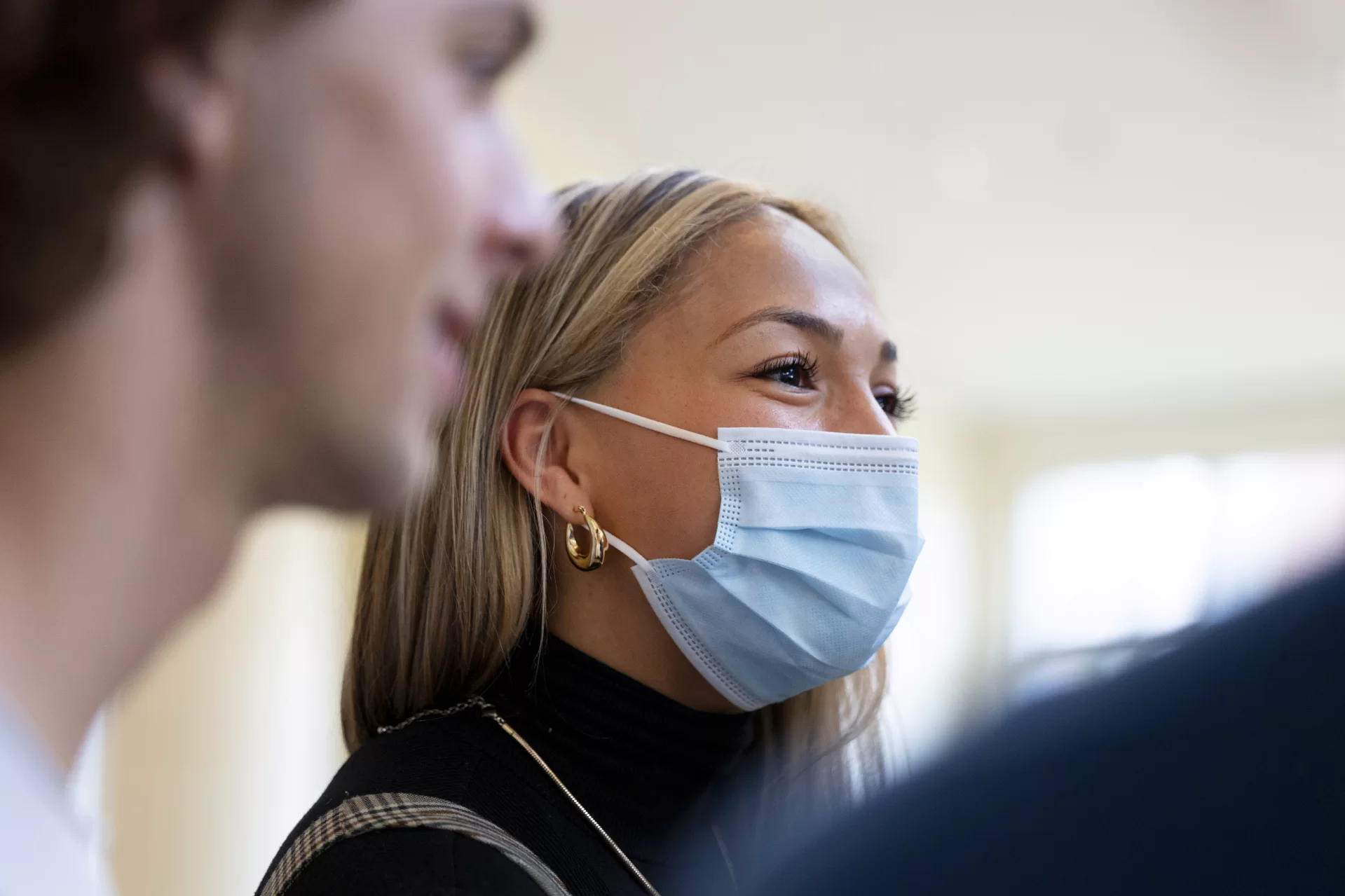
Two posters at Mount David Summit looked at the effect of social media on body image. Seen here is Ari Dalia ’22 of Brick, N.J., who took a pandemic perspective, looking specifically at the effects of social media on young adults’ perception of body image during COVID-19.
A second poster looked at the concept of gratitude and body image.
It’s said that gratitude weaves its way through most world religions. There’s science about gratitude, too, which “is pretty resolute,” noted an Atlantic story a few years ago. “Feeling thankful is good for you.” Tara Rodic ’22 of Belgrade, Serbia, took that idea and ran with it at the summit.
Her poster, reflecting her senior thesis in psychology, looked at whether being intentionally grateful for our bodies and what they can do — Fight illness! Bike! Sing! — might help reduce the well-known negative effects on body image from viewing so-called ideal bodies on social media.
Her study involved female-identifying college students, some being asked to complete a body-focused “gratitude intervention” in which they were asked what about their bodies they were grateful for, whether having lungs to breathe or eyes that they really liked. Then they were asked to view and respond to images of thin, “ideal” body types gleaned from social media.
Rodic found that participants who engaged in gratitude intervention had almost a visceral reaction to the social media body images. “They were really annoyed,” she says, “annoyed by how superficial the social media images were after feeling so grateful for their bodies.”
5:28 p.m. Not your typical serial killer
“I wanted to find biological and social explanations,” explains Amelia Waite ’22 of Falmouth, Maine. Waite’s psychology thesis compares case studies on serial killers to find shared characteristics. She hopes to identify ways to prevent violent crime.
Though there’s no such thing as a “typical” serial killer, says Waite, there are some common factors that could prompt more research, like the development of the prefrontal cortex, but “it’s difficult to just say, ‘this is what creates a serial killer,’” says Waite.
Documentaries, films, books, and podcasts about serial killers are a pop-culture phenomenon, but delving into the biological and psychological motivations behind violent crime is still a relatively recent area of study.
“I propose that in prison systems and in the criminal justice system that violent offenders are subjected to neurological and psychological assessment, to broaden the information that we already have, to be able to come up with beneficial intervention practices,” says Waite.
